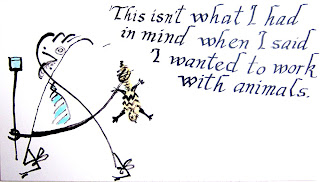
In my last post, I mentioned that Appiah "underestimates the willful ignorance of homeschoolers!" Let me clarify.
First, the book in question is
The Ethics of Identity. The author is
Kwame Anthony Appiah, professor of philosophy at Princeton and, among many other things, one of my former professors.
The quote in question is from the chapter called "Soul Making," and part of the question is the significance of public education (that is, preparing children to be good future citizens). He writes:
In recent year, some critics have objected to a history curriculum that has too much of Harriet Tubman and not enough of Thomas Jefferson; and they have also objected to a curriculum whose discussion of Thomas Jefferson focuses too much on his betrayal of liberty - in his persistent failure to emancipate his slaves - and no enough on his place as the author of the Declaration of Independence, as liberty's champion. No doubt a focus too lopsided shades off into simply untruth: the real debates here, though, are not about what happened but about what narratives we will embed them in; they are about which of the many true stories we will tell.
That seems reasonable, but that's the problem: some people aren't reasonable. And by that I don't simply mean that they want to emphasize a different set of facts, but that they want to fabricate a new set of facts to support their beliefs. (Hopefully it is clear that I'm not condemning all homeschoolers: if that's not clear, I'm about to get very specific.)
Additional background: several years ago I taught a course, "Religion in American Culture" (the course as since been renamed) at a distant campus of a large public university. The primary text I used was
The Old Religion in a New World, by
Mark Noll.
Some time after the course was over, a student sent me a number of email forwards, including one that challenged President Obama's statement, "We do not consider ourselves a Christian nation or a Jewish nation or a Muslim nation. We consider ourselves a nation of citizens who are bound by ideals and a set of values." The student was offended by this statement, but I pointed out that, even in the preambles to the state constitutions she had sent along, the phrasing was not explicitly Christian but open to other faiths (with phrases such as Almight God, Divine Providence, etc) - and that the US constitution did not have any such phrases. (We had spent a bit of time in class talking about Rhodes Island and Pennsylvania, as well as New York and Maryland, all of which had some religious liberties from the beginning).
Now, Mark Noll is an evangelical, and in the book we used is telling the story much as Appiah would expect, emphasizing some facts over others, bringing pieces together to present a coherent narrative that emphasizes Christianity. Therefore I was surprised to get this response from her (which I'm posting in its entirety):
Perhaps you should read America's Providential History by Mark A. Beliles and Stephen K. McDowell before you start spouting off mistaken information about our country's origins. Consider this my final email to a narrow-minded liberal professor who embraces the rewriting of our history. No need to reply, and may God have mercy on your soul.
(You see now why I want to emphasize Noll here: whatever you may think of me, it seems unlikely that Noll could be called a narrow-minded liberal who is rewriting history.)
And this, at long last, brings me to
America's Provedential History. (Please note that I refuse to link this book, although this lengthy
review - from a Quaker! - will give you an idea of what I'm concerned about.) At least some people are not interested in questions of emphasis: for them, Jefferson really was against slavery, Ben Franklin really did support Christianity (presumably in the form endorsed by Belile and McDowell), and omits vast amounts of basic history (mostly focusing on the colonial and revolutionary period, and apparently not getting much of that right). I have said many times - possibly on this blog - but one of the characteristics of the conservative moment is the increasing projection of their shadow on progressives (maybe I'll unpack that in a later blog post). This seems to be an instance of that: where is the rewriting happening?
To summarize: I think Appiah misunderestimates (yes, that's what I wrote - I'm surprised spellcheck still flags it) the mendacity of certain segments in the population. This is problematic precisely for the reasons he's concerned about in the book: how do we, as a nation, navigate between the requirements of particular communities and the larger polity? That question becomes fraught when some communities insist on teaching their children lies.






























